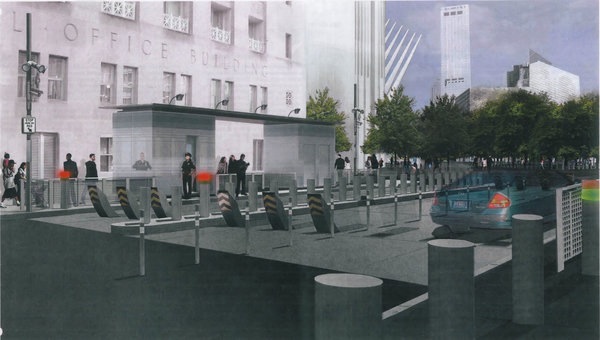By Matthew Fenton Daily Broadsheet

Security on Vesey Street; photo Matthew Fenton
The World Trade Center Neighborhood Alliance (WTCNA), a coalition of Lower Manhattan residents whose homes are adjacent to the site of the terrorist attacks of September 11, 2001, is due on court on Thursday morning to argue that the suit it filed in November against the New York Police Department (NYPD) over its security plan for the campus should not be dismissed, as the City has requested.
“The City’s reply characterized the Alliance as ‘misguided armchair quarterbacks,'” explains Danny Alterman, a lawyer representing the WTCNA. “But this response ignores that the people who formed the Alliance are almost unanimously people who lived adjacent to the Trade Center on September 11, 2001, and who were driven from their homes longer than anybody else. And in the years that followed, they suffered from the disruption of rebuilding more than anybody else.”
“These are people who know first-hand about the destruction that terrorism can cause,” Mr. Alterman continues, “so they take security very seriously. But they also value quality of life, and fear that this is what will be destroyed by this plan.” The security plan that the WTCNA is opposing calls for a variety of physical security measures, such bollards, walls, and guard houses, to surround the site, which the Alliance alleges will turn the complex into “an armed camp.”
“The people who formed the WTCNA asked repeatedly, when the security plan was being drafted in 2011, why the NYPD felt it was necessary to close streets, like Greenwich Street, that run through the site. This was especially frustrating since the Bloomberg administration and the Port Authority had been promising since 2002 to reconnect the World Trade Center site with the Lower Manhattan street grid. But the only answer they ever got was that ‘security requires it.’ In 2012, these neighbors submitted 19 questions in writing to the NYPD about its security plan, but never got any response at all.” A spokesman for the NYPD declined to comment, citing a policy of not discussing pending litigation.
“This is security for security’s sake,” alleges Mr. Alterman. “There has been no accountability or community input in formulating it. People who live here were never taken seriously, their concerns were ignored, and their efforts to participate in the process were dismissed with abrupt, canned responses. But less than five percent of the work to implement this plan has been completed, so there is still a chance to fix it. There is still an opportunity to keep the promises that were made to these communities after September 11, 2001.”
The agenda for Thursday’s hearing (scheduled for 10:00 am, in room 289 of the New York State Supreme Court, at 80 Centre Street) calls for the WTCNA to show that the NYPD’s decision thus far have been “arbitrary and capricious.”
“This is a high standard,” says Mr. Alterman, “but we feel their conduct fits this description. The City’s position has been that the police know best and shouldn’t be required to explain themselves. But these questions are too important and too serious to be decided without a public discussion. The NYPD refuses to have this conversation, however. And they aren’t required to, the consequences for people who live and work here will be enormous.”

